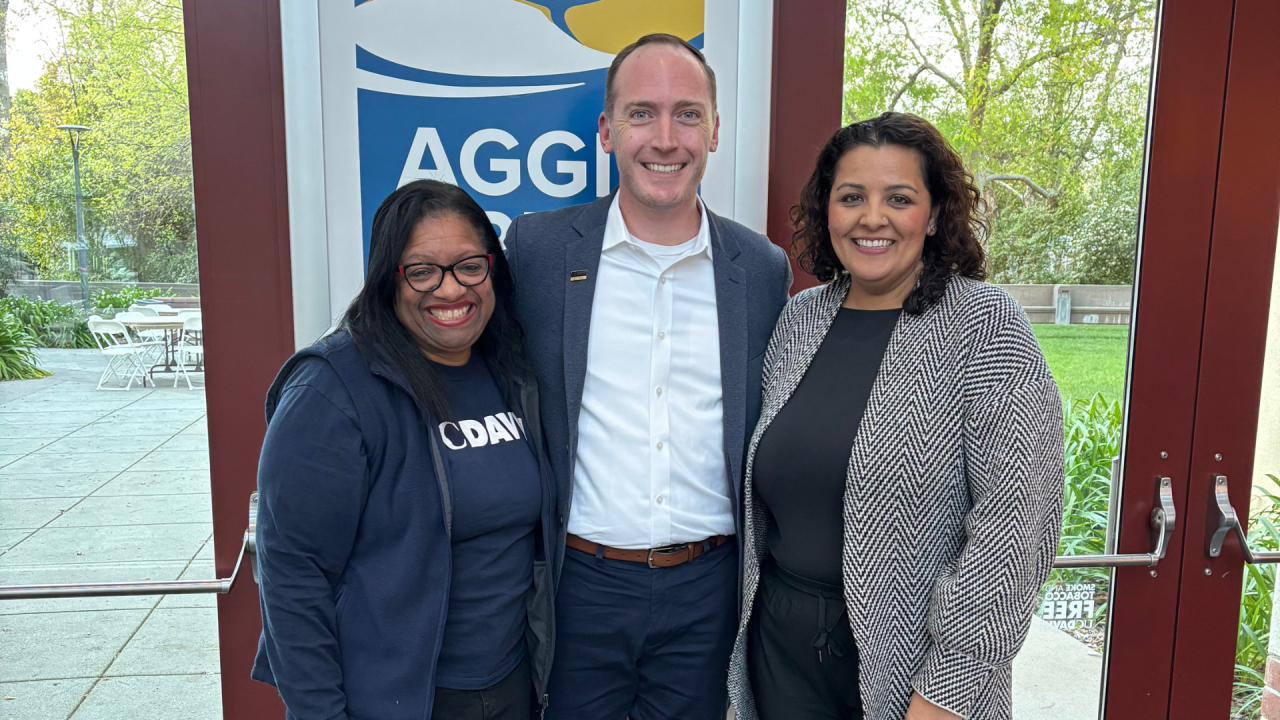
An Alumni Community of Belonging
Cal Aggie Alumni Association Is Building a More Inclusive Aggie Network
When Charles Melton ’08 became the first openly gay president of the Cal Aggie Alumni Association (CAAA), he recognized a critical need: creating a Diversity, Equity and Inclusion committee that truly represented the UC Davis alumni community. In 2022, that vision became a reality.
“This wasn’t just about representation—it’s about building a culture where every Aggie feels seen, valued, and empowered to be part of the community,” said Melton, who will be honored in May as the 2025 Young Alumni Award recipient.
What began as a bold idea quickly became a movement—driven by the commitment of inaugural co-chairs Deborah Austin ’87 and Mari Corbin Contreras ’93, M.A. ’95. With passion and purpose, the committee was born from a simple truth, articulated by Contreras:
“Of course you belong here. Period.”
Those words have become both a mantra and a mission.
Two years later, the committee continues to thrive—proof of its staying power and growing influence. In 2024, Lina Mendez, Ph.D. ’10 and Teron McGrew ’89, M.S. ’92, became a co-leader of the committee, carrying the torch forward with a focus on structure and alignment with the university’s broader diversity, equity and inclusion goals.
“Having co-chairs is more than practical—it’s culturally relevant,” Mendez said. “It reflects the value we place on shared leadership, collaboration, and community engagement. We each bring our unique experiences, and that makes the work stronger and more sustainable.”
Redefining Alumni Engagement
A primary mission of the committee is to redefine what alumni engagement can look like. By amplifying the presence of alumni at diverse graduation ceremonies—from the African American and Native American celebrations to the Latinx, LGBTQIA+, and Asian and Pacific Islander events—the committee ensures students from all backgrounds feel seen and celebrated. This expanded presence also helps forge lasting bonds between new graduates and the Aggie alumni community.
Another hallmark of the committee’s work is providing new graduates with access to alumni memberships—at a rate of only $30 a year, which is 50 percent off the normal membership rate. This gesture not only welcomes them into the fold but reinforces a sense of belonging and shared purpose.
"When you graduate, your Alumni Association should feel like an extension of the Aggie family," Mendez said. "It's about community, mentorship, and meaningful connection."
Opening Doors to Leadership
Equally transformative has been the committee's influence on how leadership is cultivated within CAAA. Once an insular process requiring nomination by a sitting board member, the path to leadership is now open to self-nomination—inviting a broader and more diverse pool of applicants.
CAAA Volunteer Committees
“I’ve always challenged people to look at diversity beyond just race,” said Austin. “We’re talking about age, gender identity, geography, religion, marital status, ability—all of it matters. The more perspectives we have, the better we serve our Aggie community.”
This small change has already made a significant cultural shift: representation on the CAAA Board of Directors has become more reflective of the alumni community it serves, and the committee’s impact has even extended to the UC Regents. Thanks to their recommendations, eligibility for alumni regent positions has expanded beyond past presidents, allowing more voices to shape the future of the university.
Shaping a Historic Moment
Today, CAAA is on the cusp of another milestone. With Austin serving as Vice President and President-Elect, and Anu Johl Singh ’04 currently serving as President, this marks the first time in CAAA history that two women—and two women of color—are leading the board. When Austin assumes the presidency, she will become the first Black person to hold that role.
For Austin, this moment is deeply personal. Her own student experience at UC Davis was shaped by barriers and bias.
“It’s meaningful because the way I was welcomed in is not going to be the way I’m welcomed out,” she said. “I want to make sure students and alumni know they belong, and that they’re supported from day one.”
Mendez echoed this sentiment.
“We’re here in large numbers across the UC system, and we need each other,” she said. “The connections I’ve made through this committee have changed my life. You never know who’s going to open a door for you—or whose door you’ll be able to open in return. That’s the power of community.”
Media Resources
Sarah Colwell is a freelance writer and marketing strategist who specializes in serving higher education clients.
